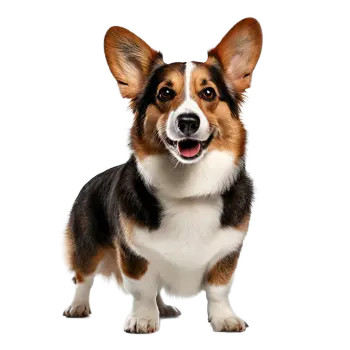The Cardigan Welsh Corgi is generally a healthy and robust breed with a respectable lifespan of 12 to 15 years, with some individuals living to 16 or 17 years with proper care. The breed's longevity reflects centuries of development as a working dog where health, soundness, and vitality were essential for performing demanding farm work. However, like all purebred dogs, Cardigans are predisposed to certain hereditary health conditions that responsible breeders work to minimize through health testing and careful breeding decisions. Prospective owners should work with reputable breeders who conduct recommended health screenings and provide health clearances for breeding stock.
Hip dysplasia represents one of the more common orthopedic concerns in Cardigan Welsh Corgis. This hereditary condition occurs when the hip joint develops improperly, creating a loose fit between the femoral head and the acetabulum of the pelvis. Over time, this malformation leads to cartilage wear, inflammation, and eventually painful arthritis in the hip joints. While hip dysplasia has a genetic component, environmental factors including rapid growth, obesity, and inappropriate exercise during puppyhood can influence its development and severity. Symptoms include difficulty rising, reluctance to jump or climb stairs, decreased activity level, and an altered gait. Management options range from weight control and anti-inflammatory medications to physical therapy and surgical interventions in severe cases.
Intervertebral disc disease (IVDD) affects Cardigans at a higher rate than many breeds due to their chondrodysplastic body type, the same genetic trait that gives them their characteristic short legs. IVDD occurs when the cushioning discs between vertebrae herniate or degenerate, potentially compressing the spinal cord and causing pain, weakness, or paralysis. Type I IVDD can cause sudden disc ruptures leading to acute paralysis, while Type II IVDD involves gradual age-related degeneration. Prevention strategies include maintaining a healthy weight, limiting jumping and excessive stair climbing, and using ramps to help dogs access furniture and vehicles. Treatment depends on severity and may involve strict rest, anti-inflammatory medications, or surgical intervention for severe cases.
Progressive retinal atrophy (PRA) is a degenerative eye disease that affects Cardigan Welsh Corgis, with a specific form called rcd3 being particularly associated with the breed. PRA causes the photoreceptor cells in the retina to deteriorate progressively over time, leading first to night blindness and eventually to complete loss of vision. While PRA is not painful, it significantly impacts quality of life as the dog loses sight. Fortunately, a genetic test exists for the rcd3 form of PRA, allowing breeders to test breeding stock and make informed decisions to reduce the incidence of this condition. Dogs with PRA can adapt remarkably well to vision loss, especially when their environment remains consistent and owners provide appropriate support.
Degenerative myelopathy (DM) is a progressive neurological condition affecting the spinal cord that leads to gradual hind limb weakness and eventually paralysis. The disease typically appears in middle-aged to older dogs and progresses over several months to a few years. Early symptoms may resemble arthritis, but as DM advances, affected dogs lose coordination, develop weakness in the hind legs, and eventually lose the ability to walk. While no cure exists for degenerative myelopathy, genetic testing can identify dogs carrying the associated gene mutation, allowing breeders to make informed breeding decisions. Physical therapy, assistive devices like harnesses and wheelchairs, and supportive care can help maintain quality of life for affected dogs.
Regular veterinary care forms the cornerstone of maintaining Cardigan Welsh Corgi health throughout their lives. Annual wellness examinations allow veterinarians to detect potential problems early when they are most treatable. Vaccinations protect against serious infectious diseases, while parasite prevention medications guard against heartworms, fleas, ticks, and intestinal parasites. Spaying or neutering is recommended for dogs not intended for responsible breeding programs, as these procedures provide health benefits and prevent unwanted litters. Screening tests for hip dysplasia, eye diseases, and genetic conditions help identify issues before they cause clinical symptoms. Weight management proves crucial for Cardigans, who have hearty appetites and can easily become overweight, exacerbating orthopedic problems and reducing overall health and longevity. Dental care including regular teeth brushing and professional cleanings prevents periodontal disease that can impact overall health. Blood work to assess organ function becomes increasingly important as dogs age, allowing early detection of conditions like kidney disease or endocrine disorders. Through attentive preventive care, appropriate exercise, quality nutrition, and prompt attention to any health concerns, Cardigan Welsh Corgi owners can help their companions enjoy long, healthy, and active lives.
Common Health Issues
- Hip dysplasia represents one of the more common orthopedic concerns in Cardigan Welsh Corgis.
- While hip dysplasia has a genetic component, environmental factors including rapid growth, obesity, and inappropriate exercise during puppyhood can influence its development and severity.
- Intervertebral disc disease (IVDD) affects Cardigans at a higher rate than many breeds due to their chondrodysplastic body type, the same genetic trait that gives them their characteristic short legs.
- Screening tests for hip dysplasia, eye diseases, and genetic conditions help identify issues before they cause clinical symptoms.
Preventive Care & Health Monitoring
- Prospective owners should work with reputable breeders who conduct recommended health screenings and provide health clearances for breeding stock.
- While hip dysplasia has a genetic component, environmental factors including rapid growth, obesity, and inappropriate exercise during puppyhood can influence its development and severity.
- Regular veterinary care forms the cornerstone of maintaining Cardigan Welsh Corgi health throughout their lives.
- Vaccinations protect against serious infectious diseases, while parasite prevention medications guard against heartworms, fleas, ticks, and intestinal parasites.
Regular veterinary check-ups and preventive care are essential for maintaining your Cardigan Welsh Corgi's health and longevity.

